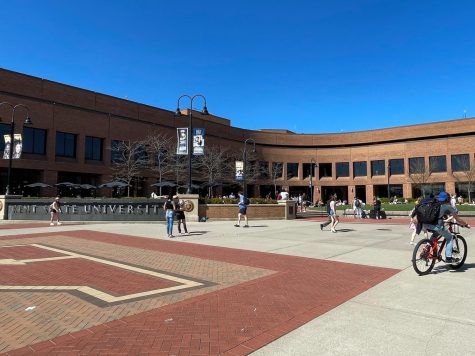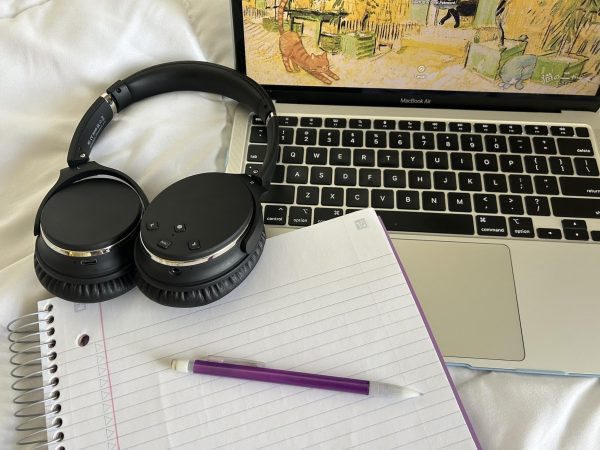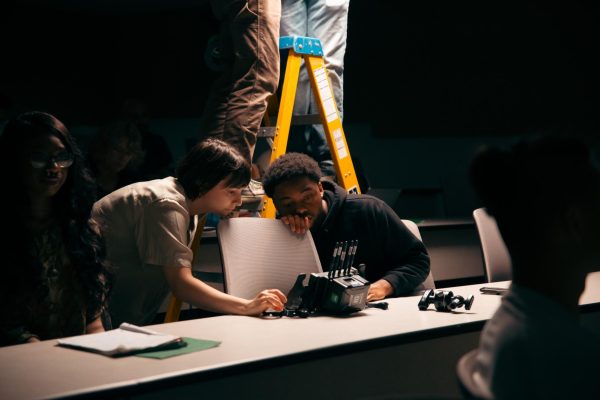Racial slur stirs controversy around campus adaptation of play
November 20, 2013
On Nov. 21, the African Community Theater will premier its production of “No Niggers, No Jews, No Dogs” in Oscar Ritchie Hall.
The period piece was written by John Henry Redwood, is directed by Terrence Spivey and follows the lives of the Cheeks, a black family living in late-1940s North Carolina and a Jewish scholar from Cleveland who is studying the effect of racial prejudice on blacks and Jews.
AFRICAN COMMUNITY THEATER TO HOST DISCUSSION, RECEPTION AT PREMIERE
No Niggers, No Jews, No Dogs,” a production of Kent State’s African Community Theater, will premier November 21 at 7 p.m. in Oscar Ritchie Hall.
Terrence Spivey, the newly appointed director-in-residence at the African Community Theater, called the production “a nail biter” in a recent interview.
“The audience will experience the true courage of a woman taken through some harsh trials,” Spivey said in a statement through the department.
The play will run a total of seven nights at the African Community Theater, located on the second floor of Oscar Ritchie Hall. The production dates are Nov. 21 to Nov. 23, doors open at 6:30 p.m.; Nov. 24, doors open at 1:30 p.m.; Dec. 6-7, doors open at 6:30 p.m.; and Dec. 8, doors open at 1:30 p.m.
Tickets for undergraduate students are free and $10 at the door for other guests.
Accompanying the play’s opening night, a free and public kick-off event will be held where students and guests can have an in-depth conversation before the show.
“Nineteenth Century African Americans: Fashion, Spirituals and Conversations” will give guests the opportunity to learn more about the historic context of the play. A reception will be in the Uumbaji Gallery, located on the first floor of Oscar Ritchie Hall, from 6 to 7 p.m.
Members of the Kent Gospel Choir will perform a selection of traditional spirituals, which were an important part of African-American life in the 1800s, according to the Department of Pan-African Studies.
Professor George Garrison from the department of Pan-African Studies will be available to discuss the combination of music and fashion in relation to the historic context of the play.
The origins of the title originate in similar signs posted in the American south. According to the Jim Crow Museum of Racist Memorabilia at Ferris State University, the signs represented a legal system that purposefully discriminated against blacks. Now, similar signs advertising the play can be seen on the walls of buildings at Kent State.
The themes of the production, along with the use of blatant racial slurs in the title have become a talking point for students and staff on campus.
“We acknowledge that it is a term soaked in blood,” Amoeba Gooden, chair of the department of Pan-African studies, said. “But we also know it’s very complex, and that there are generational understandings about the history of these words.”
Gene Shelton, associate professor and coordinator for diversity initiatives in the School of Journalism and Mass Communications, believes people need to be reminded everyday that racism still exists and not just for blacks, but for many ethnic cultures.
“The title is obviously suggestive of, ‘we don’t want you in here, we don’t want your kind,’” Shelton said. “And then you have to learn from that, in historical context. There is a valuable lesson; even though it is art and the title of a play, it was reality.”
Despite the use of racial slurs in the title, Shelton said students should be aware of the power in the arts.
“Theatre, like film, like music, is a teaching tool,” Shelton said. “There is a reason for the title. There is a message in the play. You just have to be open to hear it.”
Mwatabu Okantah, assistant professor in the department of Pan-African studies, said he thinks the theater and the arts are the perfect places to educate younger generations on the forgotten power and meaning behind racially charged words.
“These issues are very much unresolved, and they aren’t going to go away because people wish them away,” Okantah said.
Despite the artistic value of the production and the educational opportunities provided before the premier, some students expressed an eagerness to attend the show upon seeing the announcements.
“I’m excited to see it,” Roslynn Porch, the president of Black United Students at Kent State, said. “I feel it’s a production that needs to be done…and the fact that it’s being put on by Kent State students is mind blowing.”
Others were more anxious and hesitant.
“I’m not comfortable even using the n-word,” Samantha Place, freshman electronic media major, said.
Joshua Lewis, a student leader in the Inclusive Actions Movement, an organization that promotes diversity programs on campus, said using theater and the arts as a way to confront controversial issues is a great opportunity.
“I think we hear about a controversial topic and choose not to address it because we don’t want to offend anyone, to get people fired up,” Lewis said. “Sometimes people need this kind of blatant, in-your-face, this is what it is and this is what it was… But I think in order for history to not repeat itself, you need to address it, and the only way to address it is to educate people on it.”
Focusing on history is something that Ricky Marcus, director of Jewish student life at Hillel at Kent State, said is the most important aspect when addressing racially charged issues.
In relation to Judaism, “a lot of the time, we are very much in tune with our history so that history doesn’t repeat itself,” Marcus said. “I could only imagine that this is a production that hopes to show people what our history has done in the past in hopes that we don’t repeat ourselves.”
Marcus said the Jewish community on campus has been relatively unresponsive to the production or the advertisements. As for the connotation and context of the productions title, he said, “We don’t necessarily find the words offensive.”
The production will run for seven nights this semester in Oscar Ritchie Hall and each night feature an opportunity afterward for discussion. It is free for students and $10 general admission for the public.
Read Our View: When a word needs to be used here.
Contact Matthew Merchant at [email protected].























